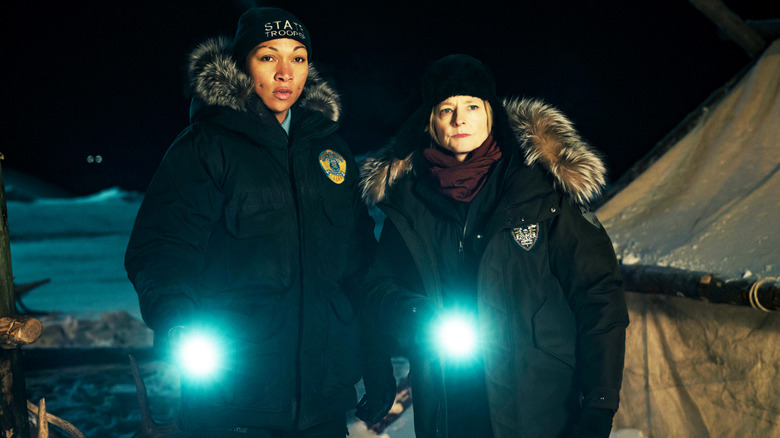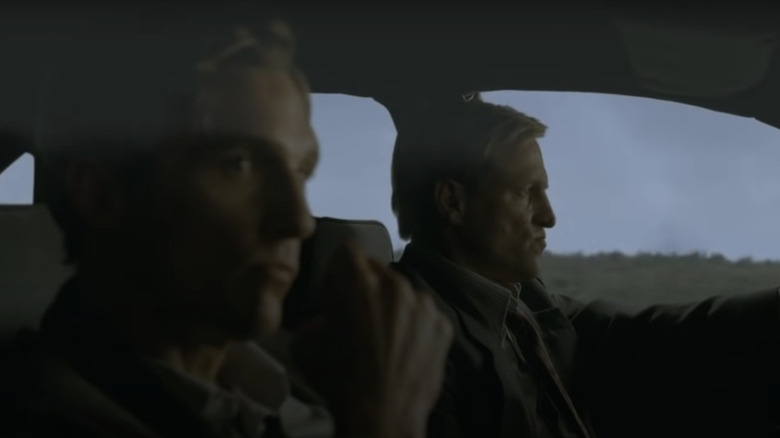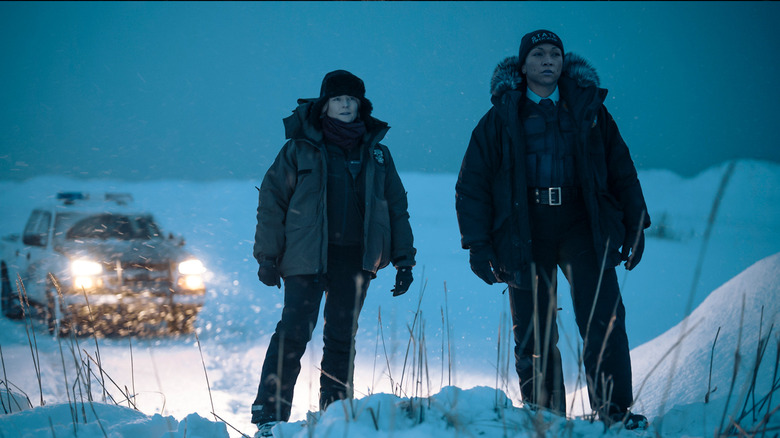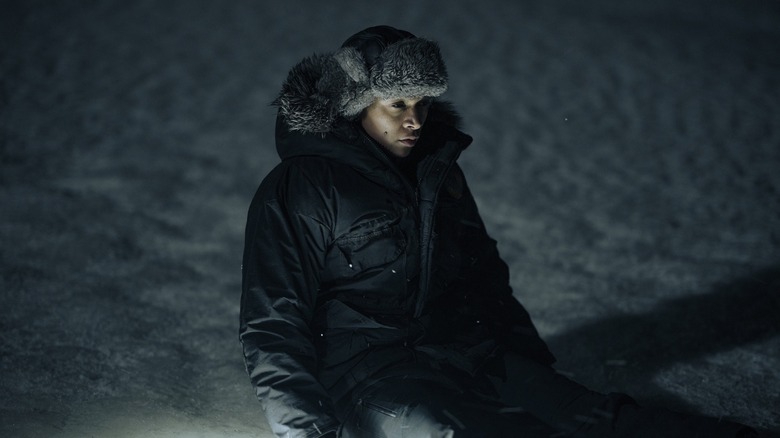Night Country Episode 3 Just Restored A Classic True Detective Trope
Anyone paying any attention to the "True Detective: Night Country" discourse will surely have noticed a rift forming among viewers. Specifically, there are those who can't stop comparing the new episodes to the original 2014 season, and those who say "Night Country" should be viewed as its own thing, entirely divorced from what came before. However you feel about it, new showrunner Issa López, who replaces show creator Nic Pizzolatto, has not only been open about how influenced she was by Pizzolatto's inaugural season, but has peppered "Night Country" with homages, callbacks, and outright continuations of themes and specific narrative threads from the 2014 episodes — to the extent that "Night Country" is essentially a stealth sequel to season 1.
Thus far, the biggest link to the initial season has been the inclusion of the spiral symbol, which cropped up throughout the "Night Country" trailer. This motif appeared throughout season 1 and represented the sinister Carcosa cult responsible for the ritual murders that Marty Hart (Woody Harrelson) and Rustin Cohle (Matthew McConaughey) investigated. What's more, "Night Country" seemingly confirmed in episode 2 that the ghostly figure witnessed by Fiona Shaw's Rose Agineau was in fact Rust's father, Travis Cohle. If that wasn't enough to link the two seasons, there's also the revelation that the family behind the Carcosa cult, Louisiana's powerful Tuttle dynasty, are funding the Tsalal research station at the center of the mystery in "Night Country."
All that is to say that Issa López's take on the crime anthology simply cannot be divorced from Pizzolatto's first season — a fact which López has seemingly been unafraid to embrace in press interviews. But it's not just spiral symbols and Rust relatives that the new showrunner borrowed from her predecessor, as episode 3 of "Night Country" proves.
Navarro's belief vs Danvers rationalism
The first two installments of "Night Country" saw Jodie Foster's Police Chief Liz Danvers and Kali Reis' State Trooper Evangeline Navarro form a shaky alliance as they investigate the deaths of the Tsalal research station workers. Much like in season 1, these two leads have already revealed significant depth after just a couple of episodes. In one of the best lines of the series so far, for example, Navarro reveals an incongruously pessimistic personal faith in God. When told by Ryan, the brother of the murdered Annie K, that it "must be nice, knowing we're not alone," Navarro answers with "No, we're alone. God, too."
But it's not until episode 3 of "Night Country" that Navarro gets to put her bleak yet firm belief in the transcendent up against Danvers' inflexible rationalism in what is a full-on revival of a classic season 1 trope. As the detective duo travels back to Ennis after questioning Annie's friend, Susan, they engage in a full existential debate over the existence of God, pitting their competing worldviews against one another in a conversation that sees Danvers say outright "There's no magic, there's a real explanation for this," before laughing at her colleague for praying in her spare time.
This recalls the thorny start to Rust and Marty's relationship, as demonstrated in that now famous car ride scene from season 1's pilot episode in which the pair clash over their differing beliefs. As it turns out, this echoing of a classic scene was entirely intentional on Issa López's part, and adds another element to the argument as to why she's the perfect fit for "True Detective."
Issa López was inspired by season one's car ride debates
"Night Country" is arguably the best season of "True Detective" since the first, and at least part of that has to do with how Issa López approached the season and her willingness to use what worked from Nic Pizzolatto's original. Speaking to the boys on the Kingcast, López, who directed and wrote "Night Country" (with the help of some co-writers on certain episodes), explained how she initially did a "deep revision" of the first season, adding:
"I decided, in my own interest or the interest of my story I was like, 'Ok you know what, I like the long drives talking about existential things, I'll keep that. I like the two characters that have opposing views of the cosmos, I'll keep that. So I kept the things that I thought were very valuable and were going to make my story better."
So there you have it, that car ride debate between Liz Danvers and Evangeline Navarro was yet another intentional callback to season 1 — which makes sense considering Marty and Rust's pilot episode car ride has become legendary among fans of the series. In that original scene, Rust can be heard referring to himself as a pessimist and declaring human consciousness to be a "tragic misstep in human evolution," before announcing that he can "smell the psychosphere." What's interesting is that while this collection of now legendary "True Detective" quotes might seem to put Rust firmly in the Danvers camp of rigid rationalism, it actually makes him more like Navarro.
Is Navarro 2024's Rust Cohle?
When season 1 first aired, the Wall Street Journal asked Nic Pizzolatto — who's also busy working on his Blumhouse horror film — about how he felt about "philosophy in general," which led the show creator to talk about Rust Cohle and how people who labeled the character a "nihilist" were missing the point:
"Cohle may claim to be a nihilist, but an observation of him reveals otherwise. Far from 'nothing meaning anything' to him, it's almost as though everything means too much to him. He's too passionate, too acutely sensitive, and he cares too much to be labeled a successful nihilist. And in his monologues, don't we detect a whiff of desperation akin to someone who protests too much?"
In that sense, Evangeline Navarro's form of disinterested faith and increasingly frequent visions of one-eyed polar bears and flashbacks to her time in the military make her much closer to Rust Cohle's thinly veiled sensitivity to the "psychosphere" than to Marty Hart's received beliefs in Christianity. Navarro is just as "acutely sensitive" to what lies beyond the physical realm as Cohle, and it's fascinating to see her inner world clash with Danvers'.
With episode 3 of "Night Country," then, fans of the first season now have yet another callback to their beloved episodes. As such, while Issa López's season should absolutely be allowed to stand on its own, that becomes complicated when Pizzolatto's initial run of episodes have such an obvious influence on what she's crafted. Add to that, the fact that "Night Country" can be seen as one big experiment to put Rust Cohle's optimistic final line to the ultimate test, and there's no denying this latest season is in part indebted to Pizzolatto's original work.



